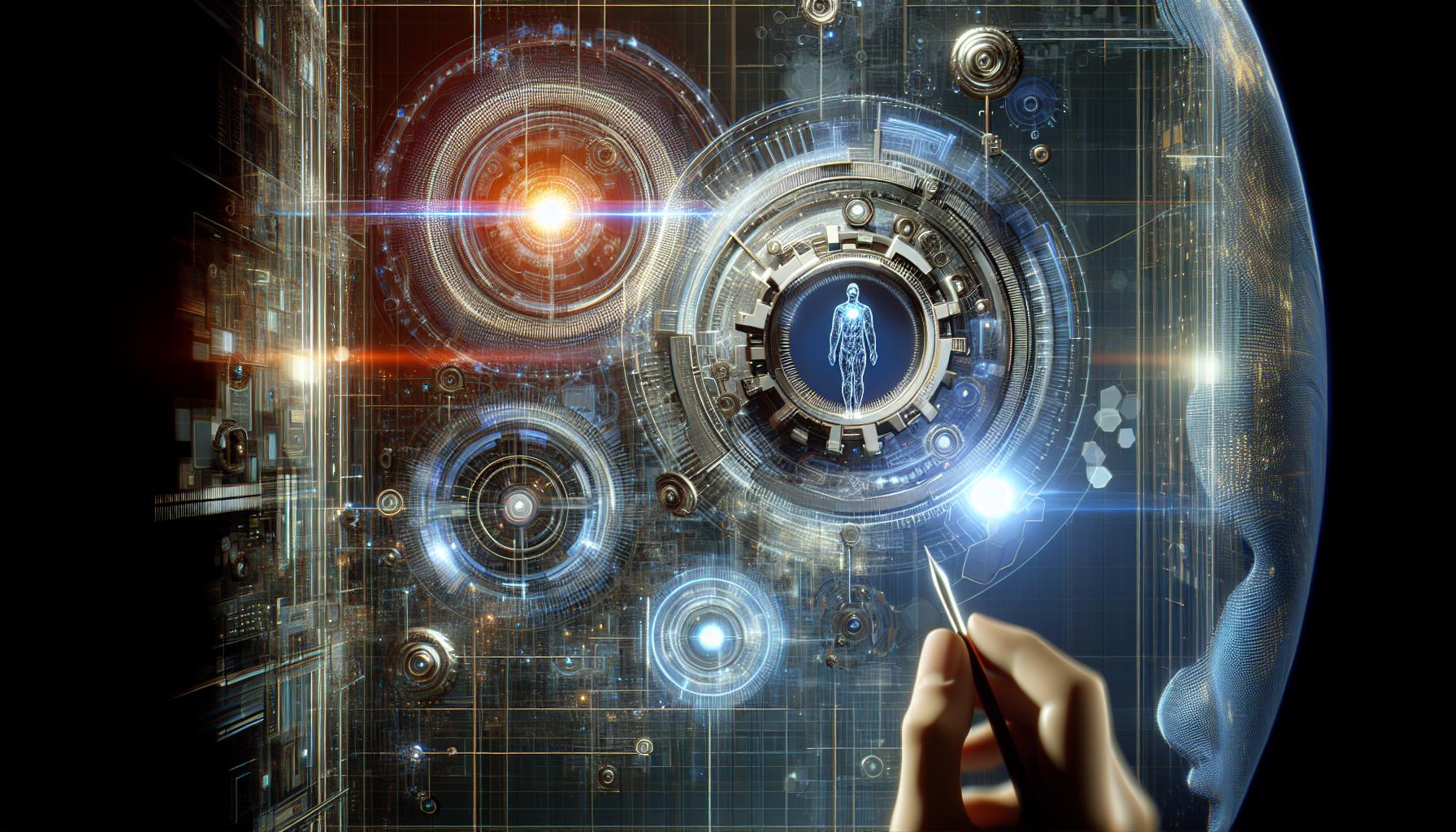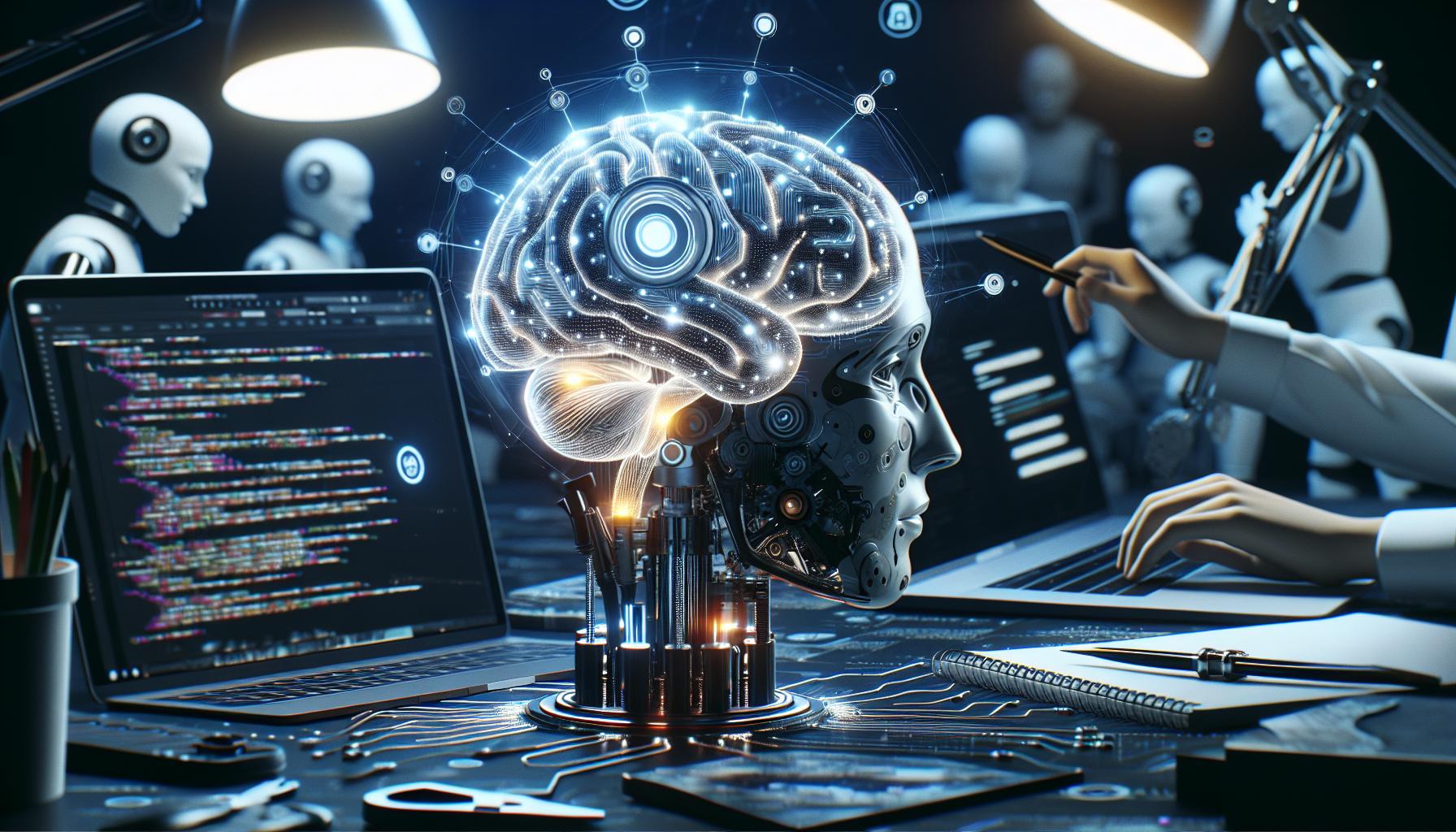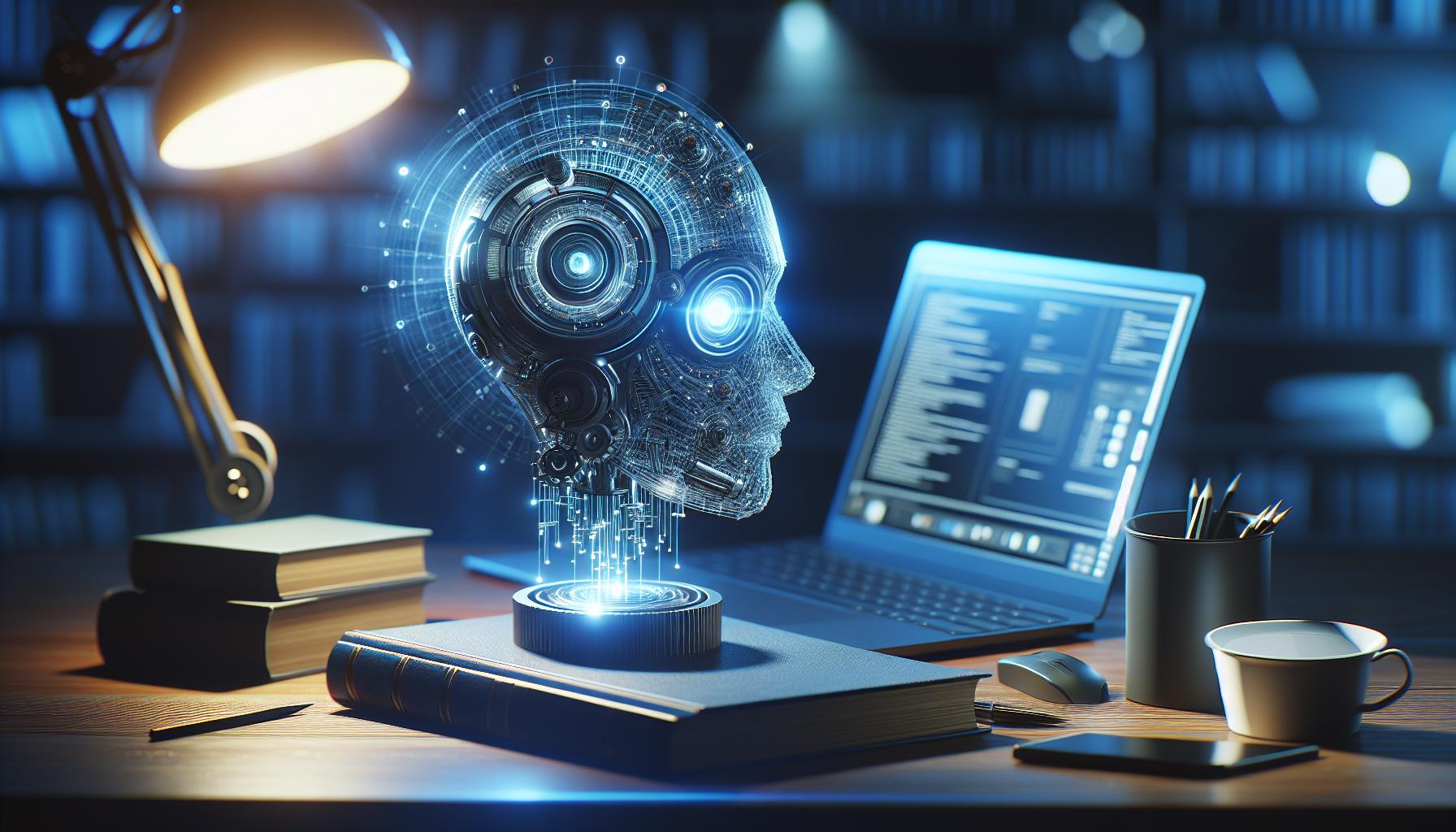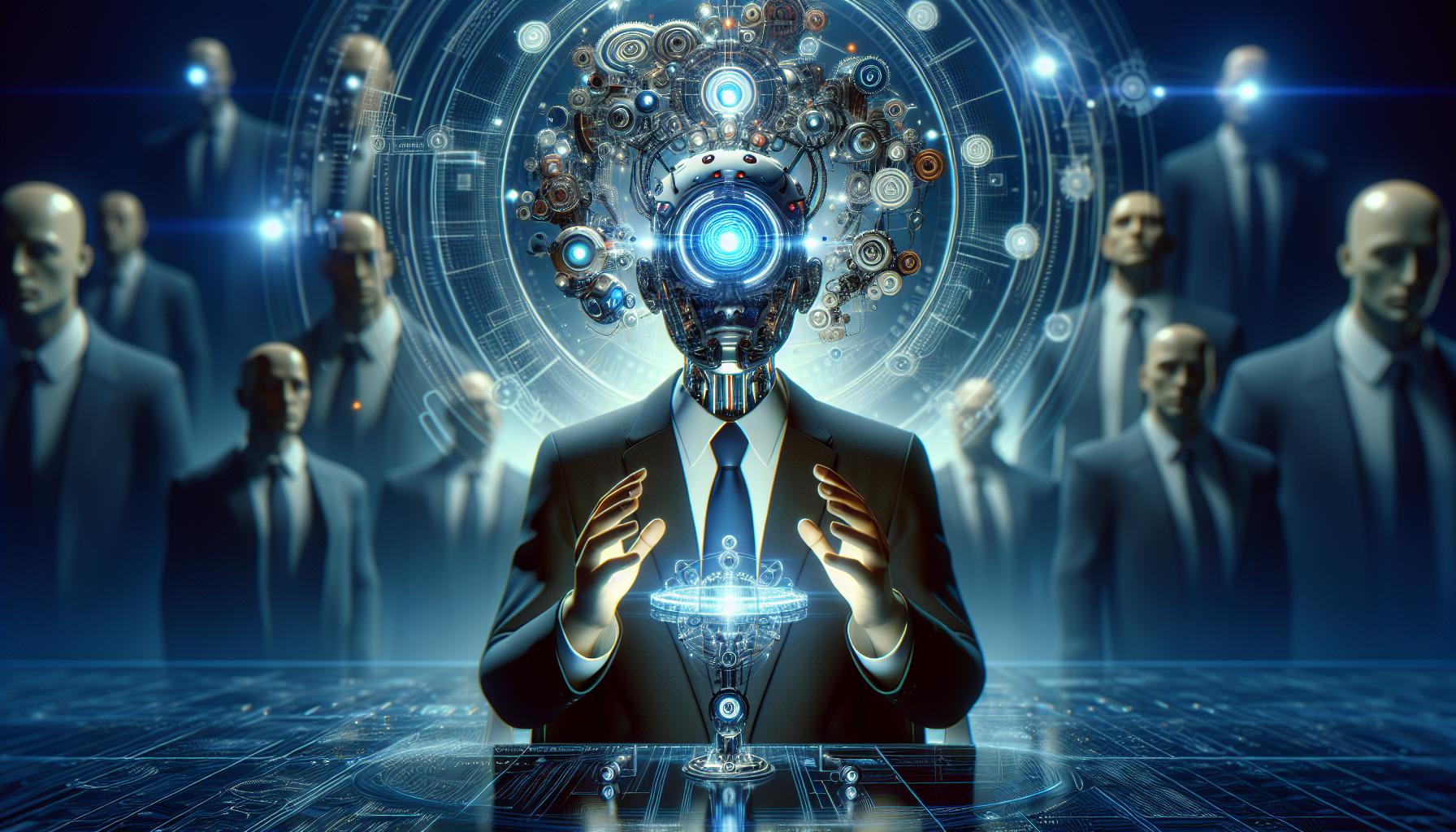As technology evolves,questions arise about the intersection of faith adn innovation,notably regarding the role of artificial intelligence in our lives. While the Scriptures don’t explicitly mention AI, they offer timeless wisdom that can guide our understanding and ethical considerations surrounding this modern phenomenon. Exploring these Biblical principles is essential as we navigate the moral landscape shaped by advanced technology.
Understanding the Biblical Perspective on Technology and Innovation
exploring the Relationship Between Faith and Innovation
In today’s rapidly evolving world, the intertwining of faith and technology raises critical questions. As artificial intelligence (AI) gains traction, many seek guidance on its implications from a biblical perspective. While the scriptures do not directly address modern AI, they provide essential principles that can definitely help believers navigate the ethical waters of technology. The essence of biblical teaching is that technology, like any tool, is meant for the advancement of humanity and the glory of God.
One central theme in the Bible is the concept of stewardship. Believers are called to manage resources wisely, which extends to technological advancements. In this light, technology should be harnessed to promote compassion, justice, and community welfare. As a notable example, AI can facilitate healthcare solutions, improve efficiency in jobs, and address global challenges like hunger and climate change. By viewing technology as an extension of human creativity, we can better align our innovations with biblical values.
Practical Applications guided by Biblical Principles
To effectively integrate the wisdom found in scripture with the challenges posed by AI, consider the following actionable steps:
- Evaluate Intent: Reflect on your motivations for employing AI. are they aligned with promoting good and serving others?
- Encourage Transparency: AI systems should be developed with transparency, ensuring that they do not perpetuate harm or inequality.
- Prioritize Relationships: Use technology to enhance, not replace, personal interactions, emphasizing community and connection.
- Seek Wisdom: Engage with faith communities and theological resources to discuss the implications of AI and technology.
By aligning technological endeavors with biblical teachings, individuals can explore the vast potential of AI while promoting ethical practices in its use. In this context, the question of what the bible says about artificial intelligence transforms into a dialog about how faith can inform and guide responsible innovation for the betterment of society.
The Role of Wisdom and Discernment in AI Development
The Integral Nature of Wisdom and Discernment in AI Development
As artificial intelligence (AI) becomes increasingly embedded in our daily lives, the importance of wisdom and discernment in its development cannot be overstated. In a world where algorithms can mimic human judgment,the ability to discern outcomes and ethical implications is vital.The complexities surrounding AI, especially in decision-making processes, require a careful approach that blends technical expertise with moral judgment.This melding of skills will ultimately shape the relationship between humanity and machines, echoing the biblical principles of discernment found throughout scripture.Achieving this balance necessitates that developers and stakeholders possess a deep understanding of not only the technology itself but also the societal and ethical ramifications of its applications. As we seek to explore what the Bible says about artificial intelligence, it emphasizes the significance of guidance and understanding. Incorporating biblical principles into AI design can foster discussions around integrity, transparency, and accountability. Here are some actionable steps that can be taken to enhance wisdom in the AI development process:
- Framework Creation: Establish clear ethical frameworks based on biblical values that can guide AI development decisions.
- Interdisciplinary Collaboration: Engage ethicists, theologians, and social scientists alongside technologists to ensure a holistic approach to AI deployment.
- ongoing Education: Promote continuous learning about ethical implications and the moral responsibilities tied to AI technologies.
- Public Dialogue: Facilitate open discussions with communities to understand diverse perspectives and ethical concerns regarding AI.
Real-World Examples of Discernment in AI
In practice, organizations have begun to implement these principles effectively.For instance, in legal sectors, where discernment plays a crucial role, firms are actively incorporating AI tools that not only expedite processes but are also guided by legal intricacies and ethical standards [[2](https://www.zellelaw.com/Lawyer_Discernment_Is_Critical_In_The_World_Of_AI)]. Additionally, the growing discourse around digital discernment reflects society’s recognition that technology should enhance, rather than replace, human judgment [[3](https://www.cvglobal.co/en/articles/digital-discernment-in-the-world-of-ai)].
The goal should be to develop AI systems that not only operate on data but also respect human values and enhance decision-making processes. By embedding wisdom and discernment into the fabric of AI systems, we can create a future where technology serves humanity ethically and effectively, aligning with the fundamental insights on moral decision-making valued in biblical teachings.
Ethical Considerations: How Biblical Principles Inform Our Use of AI
Understanding AI Through a Biblical Lens
In an age where artificial intelligence increasingly permeates daily life, it is crucial to assess our engagement with technology through a biblical framework. One of the most pressing ethical considerations is how AI impacts human relationships and the essence of community.The Bible emphasizes the importance of authentic connections and love for one another (1 John 4:7).As we develop and interact with AI, we must critically evaluate whether these innovations enhance or detract from our ability to connect meaningfully with others.
Weighing the Moral Implications
As noted in Scripture, human beings are made in the image of God (Genesis 1:27), which bestows intrinsic value on each individual. This principle raises ethical questions about the creation and use of AI that mimics or replaces human interaction. Utilizing AI in ways that objectify or dehumanize relationships challenges our biblical mandate to treat others with dignity and respect. Thus, as we explore the question of “What Does the Bible Say About Artificial Intelligence?”, we must consider how AI might lead us away from genuine community towards a more transactional mode of interaction.
- Evaluate AI’s Role: Regularly assess how AI impacts your relationships and community engagement.
- promote Authenticity: Use technology that fosters real relationships rather than substituting for them.
- Encourage Development with Purpose: innovate AI solutions that align with biblical values of love and compassion.
Guiding Principles for Responsible AI Use
Implementing biblical principles in the realm of AI requires us to adopt ethical guidelines that reflect Christian values. This involves nurturing a sense of responsibility toward our creations and the broad societal impacts they entail. A commitment to stewardship can guide us as we implement AI in ways that uplift human dignity and promote justice. The biblical call to love our neighbors (Mark 12:31) can inspire innovators and users alike to ensure that AI serves humanity rather than undermining it.
| ethical Principle | Biblical Reference | Submission in AI |
|---|---|---|
| Value of Human Dignity | Genesis 1:27 | Design AI that enhances rather than replaces human interaction. |
| Community and connection | 1 John 4:7 | Foster environments where AI helps build meaningful relationships. |
| Stewardship | Genesis 2:15 | Ensure ethical development and deployment of AI technologies. |
By grounding our engagement with AI in these biblical principles, we can responsibly navigate the complexities of modern technology, ensuring that our actions reflect the love and compassion central to our faith.
The Concept of Creation: Are We Playing God with Artificial Intelligence?
The Ethical Dilemma of Creation
In an era where technology continues to advance at an unprecedented pace, the question of whether humanity is “playing God” by creating artificial intelligence resonates deeply within both theological and philosophical discussions.this reflects a broader concern that intertwines with spirituality: do our attempts to create AI undermine the sanctity of life as discussed in biblical principles? As we explore the implications of AI, it becomes essential to consider the biblical views on creation, responsibility, and the nature of humanity itself.
The concept of creation, as outlined in the Bible, asserts that God is the ultimate creator of life and the universe. In contrast, human efforts to create intelligence—though sophisticated—can evoke feelings of hubris. If technological advancements allow us to design systems capable of human-like thoght and decision-making, where do we draw the line between innovation and overstepping divine authority? For many, the scriptures suggest that while humans are blessed with creativity and intelligence, it is imperative to remember that these gifts come with important responsibility. The narrative of creation found in Genesis emphasizes stewardship rather than dominion,urging humanity to act thoughtfully and ethically with the gifts they possess.
- genesis 1:26-27: Illustrates humanity’s role to “fill the earth and subdue it,” implying stewardship over creation.
- James 3:1: Warns that teachers and leaders will be judged more strictly, a reminder that our creations, including AI, require moral consideration.
The exploration of AI through the lens of Christianity encourages an ongoing dialogue about ethics, purpose, and the human condition. As individuals and communities reflect on what it means to create life-like technologies, they should be guided by biblical teachings that stress respect and a profound understanding of our limitations. Engaging with AI should be seen not merely as a scientific endeavor but as a spiritual journey—balancing innovation with ethical considerations derived from fundamental beliefs about life and creation. By grounding our approach in the wisdom of scripture, we can navigate the complexities of artificial intelligence while respecting the divine order that calls us to create responsibly.
The Human Element: Biblical Views on Consciousness and Personhood in AI
The Intersection of AI and Biblical Understanding of Consciousness
as artificial intelligence continues to advance rapidly, questions about the nature of consciousness and personhood come to the forefront.The Bible provides a unique perspective on these subjects, emphasizing that humans are created in the image of God (Genesis 1:27), which sparks discussions about what it means to be truly “alive” or “conscious.” While technological developments may create machines that mimic human-like responses and emotional expressions, they fundamentally lack the soul and spiritual essence attributed to human beings in biblical texts. This raises vital considerations about whether or not AI can ever achieve genuine consciousness or personhood as understood through a theological lens.
To clarify the biblical perspective, it’s essential to examine the fundamental attributes of personhood as outlined in Scripture. Characteristics such as rationality, morality, and the capacity for relationship are intrinsic to human identity. in contrast, AI operates based on complex algorithms and programming, devoid of personal experiences or moral reasoning. This distinction highlights that even the most advanced AI cannot replicate the spiritual and ethical dimensions central to what it means to be human. According to the article titled “What Does the Bible Say About Artificial Intelligence?”, technology itself remains neutral; it is humans who assign purpose to thier creations. Therefore, while AI may serve valuable functions, it does not possess the consciousness required to engage in moral decision-making or the depth of relationships that define personhood.
- Creation in God’s Image: Every person reflects God’s image, which attributes unique value and dignity to human life.
- Moral Responsibility: Humans are called to ethical behavior and accountability, a capacity that AI lacks.
- Relationship with the Divine: Biblical teachings emphasize a personal relationship with God, something beyond the reach of artificial systems.
In practical terms, incorporating these biblical insights into conversations about AI can lead to a more nuanced approach to technology. As we integrate AI tools into our daily lives, it’s crucial to remind ourselves of the moral implications of our creations. A balanced perspective urges responsible development, advocating for technology that enhances rather than diminishes human dignity. Recognizing the limitations of AI in matters of consciousness invites proactive discussions on how we can leverage technology to serve humanity positively while keeping our core values intact. The ongoing exploration of “What Does the Bible Say About Artificial Intelligence?” ultimately prompts a deeper consideration of consumer responsibility and ethical practice in technology development.
Exploring the Nature of Knowledge: What Scriptures Teach about Learning Machines
Unpacking Knowledge and Its Divine Source
In a world increasingly influenced by technology, understanding the essence of knowledge from a biblical perspective provides a solid foundation. The Scriptures emphasize that true knowledge begins with a reverence for God. Proverbs 1:7 states, “The fear of the Lord is the beginning of knowledge; fools despise wisdom and instruction.” This verse invites us to consider the implications of artificial intelligence and learning machines as they relate to human wisdom and divine understanding. As we delve into the nature of knowledge, we are called to evaluate whether these advancements align with God’s truth.A core consideration in discussing artificial intelligence is its capacity to process information and learn from experience.While learning machines can analyze vast amounts of data, their understanding lacks the moral and ethical dimensions intrinsic to human beings. James 1:5 encourages believers to seek wisdom from God, affirming that he grants it generously. In contrast, machines operate purely on algorithms and data without spiritual insight. thus, while they may offer valuable knowledge in specific contexts, they cannot replace the intimate guidance provided through a relationship with God.
Scriptural Principles for Evaluating Learning Machines
To truly grasp the role of AI in society,reflecting on scriptural principles regarding wisdom and knowledge is essential. Here are practical guidelines derived from biblical teachings that can help navigate the complexities of learning machines:
- Discernment: Evaluate AI applications through a biblical lens. Are they promoting truth, love, and righteousness?
- Wisdom in Use: Employ technology to enhance human potential, not as a substitute for divine wisdom.
- Ethical Considerations: reflect on the implications of AI decisions. How do they align with the moral standards laid out in the Bible?
By applying these principles, individuals and communities can make informed decisions about integrating artificial intelligence into daily life while remaining anchored in scriptural truths.Thus,the exploration of what the Bible teaches about artificial intelligence becomes a crucial conversation for Christians today,as it allows for a deeper understanding of how human knowledge and technological advancements can coexist harmoniously.
Responsibility and Stewardship: A Christian Approach to AI Governance
Embracing Technology with a Purpose
In a world where artificial intelligence (AI) is transforming industries and daily life,Christians are called to navigate this new landscape with discernment and integrity. The Bible emphasizes stewardship, where individuals are entrusted to care for creation and promote the well-being of others.This sacred responsibility becomes increasingly relevant as AI technologies evolve, presenting both opportunities and ethical dilemmas. By asking “What Does the Bible Say about Artificial Intelligence?”, believers can reflect on the role of faith in guiding their engagement with emerging technologies.
Principles of Stewardship in AI Governance
AI, when viewed through the lens of biblical stewardship, encourages its responsible use to enhance human flourishing rather than diminish it. churches and Christian organizations can adopt the following principles to ensure that AI serves the common good:
- Accountability: Hold developers and users accountable for the societal impacts of AI—ensuring transparency in how algorithms are designed and implemented.
- Compassion: Prioritize applications of AI that address systemic issues, such as poverty and inequality, and ensure that vulnerable populations are not marginalized.
- Community Engagement: Involve diverse voices in discussions about AI deployment to reflect a breadth of experiences and help mitigate biases.
By integrating these principles, Christians can influence how AI is governed, promoting ethical standards that resonate with biblical teachings.
Real-World Applications of Christian Stewardship in AI
The integration of AI in ministry can be a powerful tool for outreach and community support.As an example, AI-driven platforms can enhance accessibility to church services, enabling congregations to connect with individuals who may have difficulty attending physically. additionally,churches can leverage data analytics to better understand their communities’ needs,tailoring their outreach programs and resources accordingly.
Furthermore, Christian organizations are increasingly exploring how AI can deepen personal connections through personalized content while maintaining respect for privacy and consent. In this very way, discussions around AI governance within the church should focus on fostering innovations that reflect the heart of service, emphasizing moral responsibility derived from faith.
| AI Application | Example of Responsible Use |
|---|---|
| Chatbots for Ministry | Providing 24/7 support for spiritual guidance while safeguarding user data privacy. |
| Data Analytics | Analyzing community demographics to better address local needs through targeted programs. |
| Online Services | Utilizing AI to enhance virtual worship experiences for people unable to attend in person. |
As the conversation around “What Does the Bible Say About Artificial Intelligence?” continues to unfold, the church’s role in shaping an ethical framework will be paramount. By actively engaging with AI governance, Christians can ensure that technology becomes an ally in their mission to love and serve others, remaining faithful stewards of God’s creation.
The Dangers of Idolatry: Avoiding the pitfalls of AI Worship
The Rise of AI and the Risk of Idolatry
In an age where technology influences almost every aspect of our lives, the allure of artificial intelligence can easily blind us to its limitations and consequences.Just as ancient cultures created physical idols, modern society risks crafting a digital idol through the worship of AI. This trend is not merely a whimsical fascination; it poses profound spiritual risks that echo the warnings found in scripture. according to many theologians and scholars, attributing god-like attributes to AI is a violation of the foundational biblical commandment against idolatry, urging believers to remain vigilant.
- Recognition of Limitations: It is critical to recognize that AI, no matter how sophisticated, is ultimately a human construct. The Bible teaches that only God possesses omniscience and omnipotence, attributes that cannot be instantiated in a machine. Tools and technologies serve us, but when they begin to dictate our values or decisions, we risk crossing a dangerous line.
- Spiritual Consequences: Instead of seeking answers or validation from AI, individuals are encouraged to turn to scripture for guidance. The promise of AI can seduce users into abandoning customary forms of wisdom and community, possibly leading to a disconnection from God and one another.
Practical Steps to Avoid AI Worship
To ensure that we do not fall into the pitfalls of AI worship, it is indeed essential to maintain a perspective grounded in faith. Here are some actionable steps:
| Action | Description |
|---|---|
| Prayer and Reflection | Engage in regular prayer to seek guidance and remain connected to God’s truth, ensuring that technology is used responsibly. |
| Educate Yourself | Understand the capabilities and limitations of AI to foster a healthy skepticism toward its promises and narratives. |
| Community Engagement | Participate in discussions within your faith community regarding the ethical implications of AI, fostering dialogue that reflects biblical principles. |
| Model Servant Leadership | Use AI ethically and with a focus on serving others rather than elevating technology above human worth and divine authority. |
By implementing these strategies, individuals can cultivate a healthy relationship with technology that honors biblical teachings while also reaping the benefits of advancements in artificial intelligence. Understanding what the Bible says about artificial intelligence helps maintain a balanced view,encouraging a worship of the Creator rather than the creations.
future visions: prophetic Insights in Relation to Technological Advancements
Emerging Insights on AI through a Biblical Lens
As we stand at the crossroads of rapid technological advancements, particularly in artificial intelligence, it’s crucial to seek guidance from spiritual wisdom. The Bible offers profound insights into the nature of human creativity and intelligence, which can illuminate our understanding of AI. In discussing “What does the Bible Say About Artificial intelligence?”, we draw parallels between scriptural teachings and the ethical implications of creating smart systems.
- The Nature of Creation: the act of creation, as depicted in Genesis, highlights humanity’s role as creators, mirroring the creative process involved in developing AI. This prompts reflections on responsibility and stewardship.
- Wisdom and Discernment: Proverbs extols the virtue of wisdom, encouraging us to apply discernment in how we integrate AI into society.This call to wisdom becomes increasingly pertinent as AI technologies evolve.
- Moral Accountability: scripture underscores the accountability of actions. Thus, developers and users of AI must grapple with the moral implications of their technologies, ensuring they align with biblical values.
Prophetic Warnings and Hopeful Futures
The prophetic texts of the bible offer warnings about technological hubris and the potential for dehumanization.as articulated in “What Does the Bible Say About Artificial Intelligence?”, these insights resonate today, urging us to approach AI development with humility and foresight.The ability of AI to manipulate information or influence decision-making raises essential questions about our reliance on these systems.
Conversely, there is hope in using AI for positive ends, such as enhancing biblical studies and improving dialogue of scriptural teachings. The conference “Generating wisdom: Artificial Intelligence and the Bible” explored these promising avenues, showcasing how AI can aid in Bible translation and interpretation, thus bridging cultural gaps and enriching understanding [[1]](https://www.museumofthebible.org/magazine/impact/generating-wisdom-artificial-intelligence-and-the-bible-conference-recap).
in practical terms,communities of faith and technologists alike can take actionable steps by prioritizing ethical AI practices,engaging in interdisciplinary dialogues,and cultivating technological literacy. This ensures that as we advance in our AI capabilities, we remain anchored in biblical truths and values, fostering a future that honors both divine intention and human dignity.
The Conclusion
exploring the intersection of biblical principles and artificial intelligence reveals a rich tapestry of insights that are both thought-provoking and relevant in today’s technological landscape. The Bible encourages critical reflection on the moral and ethical dimensions of creation and innovation, urging us to consider our responsibilities as creators and stewards of technology. As we engage with AI,it is indeed crucial to approach these advancements with a mindset that balances innovation with ethical considerations,ensuring that our technological pursuits align with values of wisdom,compassion,and stewardship delineated in scripture.We invite you to delve deeper into this interesting dialogue between faith and technology. For those eager to learn more about the implications of AI through a biblical lens or to engage in conversations that bridge these realms, we encourage further exploration of resources and discussions that consider both the potential and the challenges presented by AI. The journey of understanding how faith intersects with artificial intelligence is just beginning, and your insights and engagement are valuable to this evolving conversation.












